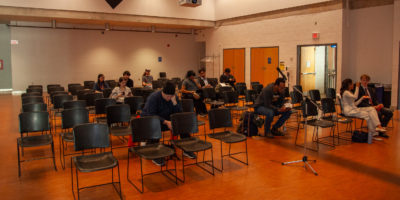By Raneem Alozzi
The provincial government is mandating that post-secondary institutions offer students the option to choose which non-essential fees they pay—but no one knows which fees are deemed non-essential yet.
In a press release from Jan. 17, the Ontario minister of training, colleges and universities Merrilee Fullerton stated the added costs of non-essential fees “can include a wide range of expenses such as student handbooks, non-student related organizations or club fees.”
It also mentioned that campus-wide services contributing to student health and safety, such as walksafe, counselling, athletics and academic support programs, will be deemed essential.
It is unclear whether the student choice initiative will overrule student-voted referendums and whether students can opt-in again after opting out.
Stephanie Rea, a media representative for Fullerton’s office, said it will be “up to the institutions to determine what constitutes essential services.”
students can opt out of non-essential fees, but nobody knows what is yet to be deemed a non-essential fee
“Students will choose the services they wish to support through an on-line process, which would be required to be available at the time students register and make arrangement to pay tuition and ancillary fees,” she said.
Ryerson University president Mohamed Lachemi said the ministry had a meeting with university and college boards to collect questions based on the new framework.
“[The ministry] had no clue about the details…I have no answers to many of the questions,” said Lachemi.
In the 2017-18 academic year, Ryerson students paid $848.56 in ancillary fees excluding program and faculty-specific fees. The only fee students are currently allowed to opt-out of is the health and dental plan which costs $323 per year.
The fees go toward the student centre, Oakham House, Ryerson’s athletic and recreational services, the Ryerson Students’ Union (RSU) and equity service centres, among others.
In an interview with The Eye, parliamentary assistant to the premier Stephen Lecce said the essential fees will definitely concern health and wellness programs, but he was unable to comment on the specifics of the opt-out option.
Ryerson’s legal counsel also said they are awaiting further details from the ministry regarding which student fees will be mandatory and which ones will not.
Nour Alideeb, chairperson of the Ontario chapter of the Canadian Federation of Students (CFS-O) said she was briefed on the government’s decisions the day of the announcement.
She said when asking questions, it felt like many of the staff members didn’t have as “as many answers as they could have.”
“We’re unsure about what this means because it could come down to the university or the college [dictating] what’s essential [or] it can come from the province,” said Alideeb.
Similarly, Ram Ganesh, the president of the RSU, said they have been in contact with their legal team to determine what their next steps will be.
“The way the student union came into existence was the result of a democratic referendum that took place and students voted for it to happen,” Ganesh said.
As a result of the referendum, the RSU structure was put in place, Ganesh said. “When the government makes this adjustment, we really need to figure out how we’re going to move forward,” he added.










Leave a Reply